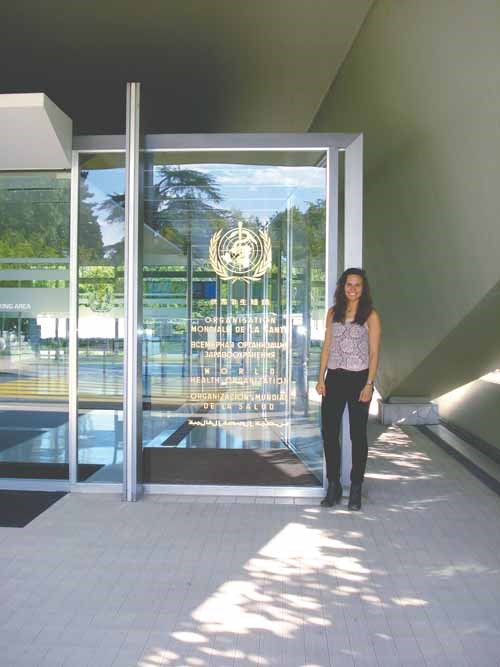It was the university internship of a lifetime for Stephanie Ortynsky, who spent four months working in Switzerland with the World Health Organization (WHO).
Ortynsky, who graduated from Yorkton Regional High School, secured the internship through the Master of Public Health program she is taking at the University of Saskatchewan. She said some internships were with the local health region, while others took students farther afield including the WHO.
The chance to work in Europe was one Ortynsky admitted she wanted badly, having already spent time in France.
"I wanted to go back to Europe for more international experience," she said. There were three spots to apply for and she did for all three.
Ortynsky, 24, ended up getting a position with the WHO, crediting that in-part to having taken French immersion at YRHS, allowing her to deal with people within the organization more easily.
The WHO is a massive organization, and Ortynsky explained she ended up working with a group focusing on vaccination policy.
Vaccination policy was not something Ortynsky was sure about.
"Going in I didn't know how much I supported vaccinations Every day I went in with wide eyes," she said, adding she had read reports linking vaccines to problems such as Autism. " I definitely learned a lot I definitely have an interest in it now."
While many do not give a lot of thought to vaccinations, Ortynsky noted "it is the number one public health accomplishment."
The area of vaccinations is one which also has good private donation support, because the effort to immunize people through vaccination saves lives.
"The success of vaccines is very measurable If you put money into it you can say you saved this many lives," said Ortynsky.
In terms of policy Ortynsky said "each vaccine the World Health Organization gives recommendations on it."
For example, work was being done in regards to the Yellow Fever vaccine, and how it interacts with other vaccines since it is often part of a regime given to travelers.
In providing recommendations, the WHO turns to experts from around the world on a given disease and vaccine. Ortynsky said when experts do apply to be part of the policy discussions they must submit resumes, and those are carefully checked. She said there can be no conflict-of-interest with experts receiving any sort of financial support from a pharmaceutical company that might be involved with the vaccines.
As for diseases fought with vaccines Ortynsky noted "there are almost 20 globally," adding when a new one is researched and released the WHO brings in experts to make recommendations on it.
The next release may be a vaccine targeting AIDs, said Ortynsky. "They are working on it in Ontario right now."
In terms of the WHO, Ortynsky explained there are 193 member states (countries), and it is these stakeholders who establish the priorities.
One of those priorities is for WHO member states to have national immunization advisory groups in place, and Ortynsky was involved in documenting which countries had such organizations in place.
At present 107 members have the advisory group, she said, adding "Canada does but they didn't answer the form."
Ortynsky said from literature it is obvious the United States also has the advisory in place, "but they never answered either."
While there are 107 countries with the advisory committees in place, Ortynsky said when measured against six indicators of how well those advisory groups are working, "only 15" made the grade, and "a lot of those were European countries."
In creating a report on the advisory groups, a process Ortynsky was part of, she said the WHO was trying "to encourage other countries to share good practices about these advisory groups."
Ortynsky said her WHO experience is part of an evolving idea of where she wants to work in the public health field once she graduates in a year.
"Initially I was thinking I wanted to do hospital administration, but now I'm thinking more policy wise, maybe with government, or a non-profit organization," she said, adding, "I want to move out east to Ottawa."
Ortynsky explained the Canada Health Act is up for review in 2014, and key issues such as universality will be discussed.
"It would be really cool to be there for that in a couple of years' time," she said.
The variety within public health and the way it relies on people working together is one of its biggest draws, said Ortynsky.
"The field of public health is very multi-disciplinary - you can draw strengths from many areas," she said. "I like that about the field, that it's very collaborative."




